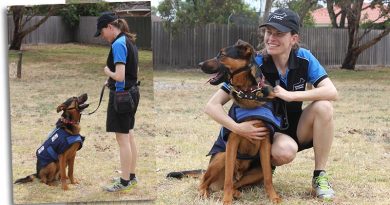Navy paving the way with robot-controlled technology
Share the post "Navy paving the way with robot-controlled technology"

As most sailors can attest, because of their bases’ proximity to the water, from time to time they have a problem with rodents.
Now, when I say “rodents” I don’t mean water transport soldiers, I mean rats.
And when I say “problem,” I mean finding mysterious entries scrawled on the kitchen walls that read:
‘Git mor cheeez’
However, I know that they aren’t alone in this, and that their neighbours in King Cross in particular undoubtedly have the same rodent problem.
I know this because 1) They are neighbours of a Naval Base, and therefore live as close to the wharf as the sailors do, and 2) Because sailors routinely lob assorted bits of cheese into their neighbours’ yards before going to bed after their weekly cocktail party.
[Note to neighbours: The sailors are NOT trying to entice the rats from their base and into your home; they’re simply trying to entice you to eat more cheese.]That said, some recent discoveries could change the way we go about solving our rat problem.
According to a recent article in the journal ‘Nature’, researchers at the University of Queensland have created the world’s first living remote-controlled rat.
By implanting tiny electrodes in the rats brains, scientists can command the rats to turn left or right, climb trees, navigate mazes, and, in some cases, stage dramatic lightsabre duels while dressed as tiny Star Wars characters.
The science involves three electrodes, implanted at specific locations in the brain, which are then triggered by a remote device which produces controlled responses in the rat.
Interestingly enough, this very same technology is utilised by many wives, who use the TV remote to trigger controlled responses from husbands by switching the channel whenever they get up to use the bathroom.
 “Hey, what happened to the game?”
“Hey, what happened to the game?”
“You weren’t watching it.”
“I was in the bathroom for 30 seconds!”
“Did you put the lid back down?”
[Controlled response:]“…I’ll go check.”
Understandably, there are those who think that manipulating rats (or husbands) is inhumane, and that it is only the first step toward an “Orwellian” world of human-control technology.
While this is certainly possible, others argue that we can’t dismiss the many practical applications that Robo-rats offer.
For example, Professor Sarah Young of Queensland University says the research “holds the promise of using animals as couriers to reach trapped victims.”
I don’t know about you, but when trapped beneath a crumbled building, I can honestly say a rat is just about the LAST thing I want coming in after me.
Don’t get me wrong. I’m not saying that Robo-rats don’t have their place. It just doesn’t happen to be anywhere near ME.
Or my house.
But at my neighbours is fine.
…and a Navy Base too.
To be honest, it wouldn’t exactly come as a shock. Especially with all of that cheese they’ve got lying around…
Andrew Douglas is a long-suffering Aussie Digger who, after many hours of sitting in a pit with a notebook and pen writing his woes, has turned his hand to writing for leisure and entertainment in the comfort of his lounge room. He and his partner, Sonia, live in a 100-year-old home in southern NSW, where Andrew uses his home-repair skills to make improvements, such as being able to flush the toilet by turning on the garden tap.
.
.

.
.
Share the post "Navy paving the way with robot-controlled technology"





